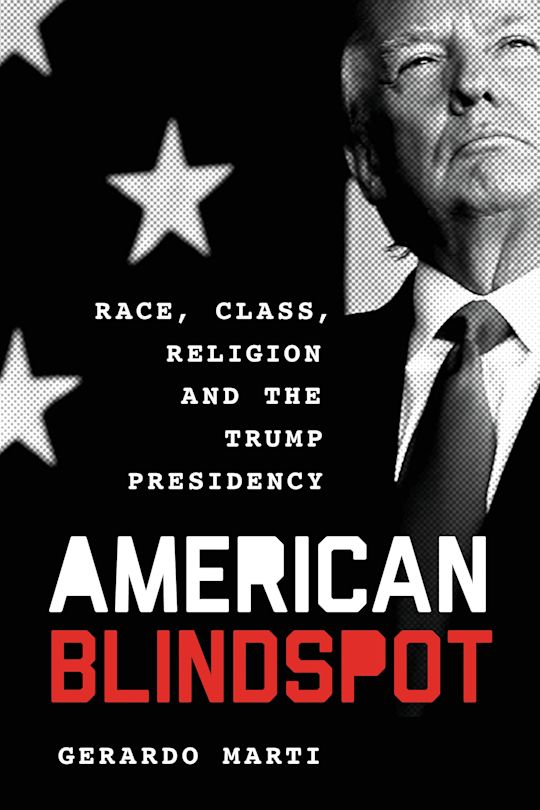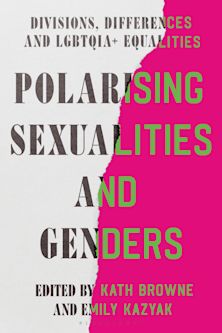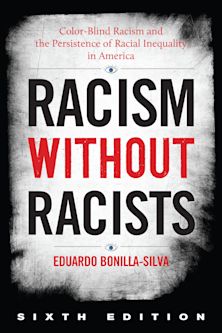- Home
- ACADEMIC
- Sociology
- Sociology of Inequality and Social Divisions
- American Blindspot
Inspection copy added to basket
This title is available for inspection copy requests.
Please note our inspection copies are only available in ebook format, and are fulfilled by VitalSource™. If an ebook isn’t available, please visit our inspection copy page for more information.
Buy from Bloomsbury eTextBooks
You are now leaving the Bloomsbury Publishing website. Your eBook purchase will be with our partner https://www.vitalsource.com.
Your credit card statement will show this purchase originating from VitalSource Technologies. They will also provide any technical assistance you might require.
You must sign in to add this item to your wishlist. Please sign in or create an account
Description
American Blindspot: Race, Class, Religion, and the Trump Presidency is a careful exploration of the forces that led to the election of the 45th president of the United States.Author Gerardo Martí synthesizes the latest scholarship and historical research to examine the roles that race, class, and religion have played in politics—both historically and today. This book goes beyond the initial claims that the American working class was the force behind Donald Trump’s election or policies and instead offers a nuanced perspective on how race, religion, and class have shaped our national views, Trump’s election, and his policies.
Table of Contents
Chapter 1: The Unexpected President: The 2016 Trump Election and White Evangelical Support
Chapter 2: Deep Cultural Background on Racial Inequality: Slavery and Territorial Expansion in Early America
Chapter 3: Racialized Power and Constraints of Freedom after Slavery: Failure of Reconstruction
Chapter 4: A “True American” Identity: Immigration and the Restriction of Citizenship
Chapter 5: Business-Friendly Evangelicalism: Theological Turn of Mid-Twentieth-Century Christianity
Chapter 6: The Establishment of Free-Market Conservatism: Religious Imperatives of Regan-Era Economics
Chapter 7: Reactionary Politics of the Tea Party: Barack Obama and His Critics
Chapter 8: Increased Concentration of Elite Wealth through Asset Growth: The 2007 Market Collapse and the Rule of Finance
Chapter 9: Identity Politics and Evangelical Support: Trump’s White Christian Nationalism
Chapter 10: Conclusion: Ethnoreligious Structures of Inequality in the Trump Presidency
Notes
Bibliography
Product details
| Published | 10 Jan 2020 |
|---|---|
| Format | Ebook (Epub & Mobi) |
| Edition | 1st |
| Extent | 330 |
| ISBN | 9781538116104 |
| Imprint | Rowman & Littlefield Publishers |
| Publisher | Bloomsbury Publishing |
About the contributors
Reviews
-
This book is not about President Trump’s personality or his tweets. Rather, it traces the role of race, economic power, and Christianity over centuries in the US to reveal the historical trends that led to Trump’s victory. Martí (Davidson College) emphasizes scholarly sources with a fresh take to explore history that is “not hidden but neglected” (p. 21). Chapters on race cover not only African Americans but also Native Americans, Mexicans, and both Asian and European immigrants. Another important line of analysis concerns the blending of free market capitalism with evangelical Christianity—business-friendly evangelism and Christian libertarianism. That analysis nicely sets up a discussion of elites' wealth and the intellectual development of neoliberalism. . . Ultimately, Martí finds that, despite Trump’s positioning himself as an outsider to politics, his policies are consistent with longstanding racial, economic, and religious structures. . . Martí paints a vivid (if sometimes depressing) picture that will likely fill in the blind spots of most readers' understanding of the US. Summing Up: Recommended. Upper-division undergraduates through faculty.
Choice Reviews
-
In American Blindspot: Race, Class, Religion and the Trump Presidency, Gerardo Martí deftly avoids facile, pop-explanations for Trump’s ascendency, and instead provides a carefully crafted historical account of the interrelated racial, religious, political, and economic currents that together culminated in Trump’s surprising 2016 victory. . . . given that much of the content of the book emerged from Martí’s advanced seminar at Davidson, I think the book would make an ideal text for courses that touch on similar topics. I would also recommend it for the busy scholar or pastor wishing to access a one-stop text for learning about the problematic racial, religious, and economic streams feeding Trump’s maddeningly resilient approval ratings.
Sociology of Religion: A Quarterly Review
-
Martí’s book American Blindspot: Race, Class, Religion and the Trump Presidency is a thorough & broad-reaching scholarly analysis of evangelical Trumpism to date.He has read widely in the history and sociology of American evangelicalism, making his book a useful primer for pastors, laypeople, religion reporters and academics.
Faith & Leadership
-
American Blindspot: Race, Class, Religion and the Trump Presidency by Gerardo Marti provides readers with an unflinching portrait of America in the hopes that clearer historical and sociological vision will produce more accurate political analysis in the future. . . . For a growing chorus of scholars, journalists, and activists, the key to overcoming this dissonance is by abandoning the easy mythology and embracing the messy complexity of the real Americanstory. American Blindspot is a fine contribution to this collective effort.
Journal for the Scientific Study of Religion
-
Overall, the American Blindspot tells an important history of America and provides a much needed insight on the social dynamics that led to the Trump presidency. . . this book would be a useful resource for all sociology instructors. . . . While reading the book, I found myself pausing to reflect, take notes, and have thought-provoking discussions with colleagues. Whether using it as a resource or assigning it for class, one will likely find American Blindspot to be constructive and compelling.
Teaching Sociology
-
Writing with accessible clarity, Martí takes us through the long and deep history that has shaped the American system of white privilege, woven it into our identity and economic order, and sanctified it in the churches. Through both original historical sources and the best recent scholarship, this book shows us why we should not have been surprised by the 2016 election and its aftermath.
Nancy T. Ammerman, professor emerita, Boston University and author, Baptist Battles: Social Change and Religious Conflict in the Southern Baptist Convention




































